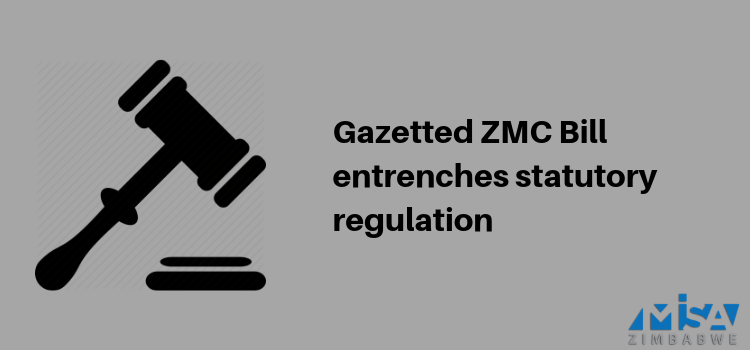The government of Zimbabwe on 9 August 2019 gazetted the Zimbabwe Media Commission Bill [H.B. 8 of 2019].
This is the second of three official Bills meant to replace the discredited and restrictive Access to Information and Protection of Privacy Act (AIPPA).
When passed into law, the Zimbabwe Media Commission Bill is meant to give effect to repeal sections of AIPPA that dealt with regulation of the media in Zimbabwe.
Unfortunately, despite government’s initial commitment to the more democratic regulatory framework of media co-regulation, coupled with attempts by media stakeholders in Zimbabwe to assist in the formulation of that model, the Bill reverts to the status quo ante through further entrenching statutory regulation. Though the Ministry of Information, Publicity and Broadcasting Services’ draft, made an attempt at infusing self-regulatory elements to the law, thereby creating the more desirable co-regulatory system, the gazetted bill strengthens statutory regulation, against the recommendations of the industry.
The Bill equally retains the contentious sections of AIPPA which criminalise expression and the industry of journalism through leaving wide and discretionary powers to the commission to come up with regulations that achieve the same.
The gazetted bill imports several problematic sections from the Commissions of Inquiry Act [Chapter 10:07] which empowers the commission to request for the support of Zimbabwe Republic Police, “during an investigation, hearing or inquiry”. This is a problematic development given the history of Zimbabwe and the implications of police presence in processes that are related to the enjoyment of rights of expression and media freedom.
Elsewhere, the Electoral Act of Zimbabwe had to be amended to deal with provisions that finally led to the police being recused from performing duties in a polling station. This was to attend to fears that their presence, by nature would contribute to self-censorship and limiting the exercise of free choice.
The gazetted bill compromises the independence of the Zimbabwe Media Commission (ZMC) through the permeating role and powers given to the Minister of Information, Publicity and Broadcasting Services.
Section 235 (1) of Constitution states that:
(a)are independent and are not subject to the direction or control of anyone…
(c)must exercise their functions without fear, favour or prejudice;
Although they are accountable to Parliament for the efficient performance of their functions;
(2) The State and all institutions and agencies of government at every level, through legislative and other measures, must assist the Independent Commissions and must protect their independence, impartiality, integrity and effectiveness.
(3) No person may interfere with the functioning of Independent Commissions.
In its current wording, the Bill subordinates the commission to the ministry, which highly compromises its functions and independence. The commission cannot make substantive decisions without consulting the minister. This is a violation of the constitution of the country. Chapter 12 institutions should be way above all persons, for them to effectively perform their duties of supporting and strengthening democracy.
In section 10 of the Bill which outlines conduct of investigations, the Minister is given super and sweeping powers to gag the process of inquiry, hearing or investigation through a certificate if he or she thinks that the information disclosure will be contrary to the public interest, defence, external relations, national and economic interests.
This clearly suggests that the Minister is above the Constitution of the country which states that “No person may interfere with the functioning of independent commission”. In its current form, the bill seeks to belittle the ZMC as a lesser commission compared to the rest.
It is MISA Zimbabwe’s position that we have taken too long to review our laws and embarking on the law reform process should be holistic and far-reaching rather than taking this rather unfortunate route of attempting to repackage AIPPA through splitting the bills for convenience and self-service. Zimbabwe will not be better under AIPPA (II). The country is yearning for a genuine law reform process which would engage is a surgical process of addressing the challenges we have grappled with in the past two decades of undemocratic regulation.
Golden Maunganidze
Chairperson
MISA Zimbabwe
84 McChlery Drive, Eastlea
Harare, Zimbabwe
Telephone: +263 4 776165/746838 Email: misa@misazim.co.zw Twitter:@misazimbabwe Facebook: MISA Zimbabwe Website: https://zimbabwe.misa.org









